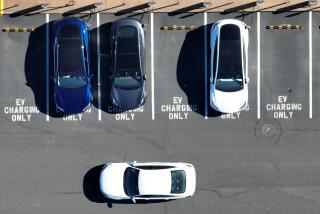Panel OKs Bigger Budget for Roads
- Share via
WASHINGTON — A key Senate committee loosened its belt Tuesday by voting to inflate the pot of money spent on the nation’s roads and bridges over the next six years in a deal that could mean more federal funds for car-dependent California.
The agreement would add $26 billion to the massive public works bill that lays out spending for the nation’s transportation needs over the next six years, giving every state more money to spend on its roads.
“California’s economy depends on our ability to move our products and people and this bill is the cornerstone of that effort,” said Sen. Barbara Boxer (D-Calif.). “It is critical for California jobs, environment and quality of life.”
The Senate could take up the amendment for additional money today as part of its consideration of a $171-billion transportation bill--one of the biggest in the nation’s history.
But transportation experts were withholding celebration because not a penny of the new money would be used for transit projects to help ease clogged freeways--an area where California sorely needs relief. That money would come from a separate bill yet to be considered by the Senate.
Congressional staff members are strategizing over how much to increase transit money, if at all. States such as California and New York are pushing for an extra $5 billion above last year’s level in transit money to pay for new buses and construction projects, such as Metro Rail.
Senate aides are predicting a floor fight over the transit issue before a bill is passed. Los Angeles--the single largest recipient of federal money for new rail projects--would be in line for a big share of any increased funding devoted to transit.
The old transportation funding bill expired last year and lawmakers have battled fiercely over the terms of the new one. During last year’s debate, deficit-watchers were determined to abide by the 1997 balanced budget agreement while others sought to meet the nation’s transportation needs with more spending.
Unable to reach agreement, Congress extended the old bill until May 1 and adjourned.
Now lawmakers are going at it again--but the nation’s finances are considerably rosier than they were last year. On Tuesday, in fact, the Congressional Budget Office projected that the government will show a budget surplus when the fiscal year ends Sept. 30. Previous projections had forecast that the surplus would not occur until the next fiscal year.
Those developments have altered the transportation funding debate. For years, a 4.3-cent-a-gallon federal tax paid at the pump for road construction and repairs was held in reserve to offset the deficit. With a budget surplus apparently now in hand, many lawmakers are calling for the money to be freed up for its original intent.
After days of talks, Senate negotiators did just that, tapping those funds to come up with the extra $26 billion.
California fares well under the outline of the Senate deal, as does every state because the federal pie is bigger. But the picture darkens a bit upon closer inspection, experts said, because California’s slice of the pie is actually smaller than it was under the old bill.
The state now gets 9.3% of federal money set aside for transportation projects, a share that would drop to 9.1% under the Senate bill.
Under the new measure, the state would come out with more money overall--about $2.2 billion a year for highway projects--but not as much as it would have had its portion of the pie stayed the same. Experts say the state would lose out on about $150 million over six years.
“Relative to other states, California took something of a backslide,” said Tim Ransdell, executive director of the California Institute, a Washington think tank.
But Boxer noted that the Senate bill also creates new money for which California would now be eligible--including $36 million a year to improve traffic in densely populated areas like Los Angeles.
The state could also be eligible for a portion of the $90 million a year set aside for border infrastructure and trade corridor improvement, a program sponsored by Boxer.
But final Senate legislation is a long way from passage, with several other amendments creating a potential thicket for debate.
One of the thorniest amendments concerns affirmative action. It would end a federal requirement that 10% of highway and transit money be set aside for businesses owned by women and minorities.
The House is set to take up its version of the bill in a few weeks. Some House members have proposed spending even more on the nation’s transportation needs. And with the largest delegation of any state, California’s 52 members are expected to have considerable sway on the House debate.
More to Read
Sign up for Essential California
The most important California stories and recommendations in your inbox every morning.
You may occasionally receive promotional content from the Los Angeles Times.













